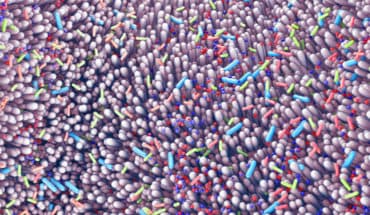The number of people throughout the world who suffer from a fish allergy is constantly increasing. The collagen contained in fish is an important allergen for many sufferers but is present in insufficient quantities in most commercially available diagnostic tests based on aqueous extracts of allergen sources. The reason for this could be that collagen does not dissolve in neutral aqueous solutions. A research team led by Heimo Breiteneder and Tanja Kalic from MedUni Vienna’s Institute of Pathophysiology and Allergy Research has now demonstrated the importance of collagen for the comprehensive diagnosis of fish allergy. The study was recently published in “The Journal of Allergy and Clinical Immunology: In Practice”.
With increasing frequency, the consumption of fish or fish products triggers severe allergic reactions. This form of allergy is associated with a higher probability of anaphylactic shock than many other food allergies. On top of that, skin contact with fish or accidentally inhaling fish fumes can trigger an allergic reaction. However, knowledge about the allergens contained in fish is not yet sufficiently comprehensive. The research group from the Institute of Pathophysiology and Allergy Research of the Medical University of Vienna, led by Heimo Breiteneder and Tanja Kalic, has been studying this field for a long time, with the aim of improving the diagnosis of fish allergy to ensure the safety of patients.
For example, in 2018, the researchers identified the thornback ray as a potential alternative food source for people with a fish allergy, since it has a lower allergenic potential. In their latest study, they describe the collagen contained in fish as an important allergen that is often overlooked during diagnosis. Kalic says: “Our research results are of great importance, because patients are not only exposed to the collagen if they eat fish but also through various cosmetic, pharmaceutical and food products that may contain fish collagen. Recognising its allergenic potential and including it in the diagnosis of fish allergies are therefore crucial in terms of patient safety. Fish collagen is now officially registered as an allergen in the WHO/IUIS Allergen Nomenclature Sub-Committee database, which, we hope, will increase awareness of it.”
Speaking about the problem of diagnosing a fish allergy, Breiteneder explains: “A possible reason for the lack of understanding of the allergenicity of fish collagen is that it is insoluble in neutral aqueous solutions, which means that it is not present in solutions that are normally used in research and diagnosis. In our study, we therefore extracted collagen from fish tissue using a specific cleaning technique with strongly acidic solutions. Our study highlighted the need to characterise individual allergens and include them in diagnostic panels, especially allergens with unusual biochemical properties.”
The study was conducted in collaboration with the research group led by Andreas Lopata from James Cook University in Townsville, Australia, and other Australian research institutes. It includes a cohort of more than 100 fish allergy sufferers. Using specific IgE measuring techniques and cell-based tests, this study showed that collagen is an important allergen for approximately 20% of fish allergy sufferers, some of whom tested negative for other known fish allergens.
- Christmas unrest – sleep solutions - 16th December 2024
- Machine learning for child vaccinations - 16th December 2024
- How to Have a Pet-Friendly Christmas - 16th December 2024






